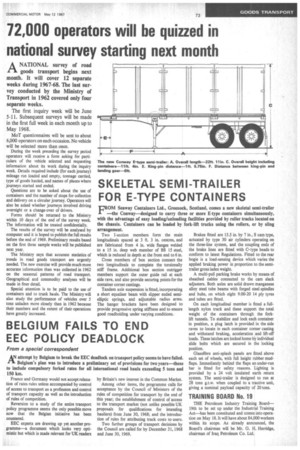72,000 operators will be quizzed in national survey starting next month
Page 75

If you've noticed an error in this article please click here to report it so we can fix it.
ANATIONAL survey of road goods transport begins next month. It will cover 12 separate weeks during 1967-68. The last survey conducted by the Ministry of Transport in 1962 covered only four separate weeks.
The first inquiry week will be June 5-11. Subsequent surveys will be made in the first full week in each month up to May 1968.
MoT questionnaires will be sent to about 6,000 operators on each occasion. No vehicle will be selected more than once.
During the week preceding the survey period operators will receive a form asking for particulars of the vehicle selected and requesting information about its work during the inquiry week. Details required include (for each journey) mileage run loaded and empty, tonnage carried, type of goods hauled, and names of places where journeys started and ended.
Questions are to be asked about the use of containers and the number of stops for collection and delivery on a circular journey. Operators will also be asked whether journeys involved driving overnight or a change-over of drivers.
Forms should be returned to the Ministry within 10 days of the end of the survey week. The information will be treated confidentially.
The results of the survey will be analysed by computer and it is hoped to publish the full results before the end of 1969. Preliminary results based on the first three sample weeks will be published next year.
The Ministry says that accurate statistics of trends in road goods transport are urgently needed. The new exercise will provide much more accurate information than was collected in 1962 on the seasonal patterns of road transport. Geographical and commodity analyses will be made in finer detail.
Special attention is to be paid to the use of containers and to trunk hauls. The Ministry will also study the performance of vehicles over 5 tons unladen more closely than in 1962 because their numbers and the extent of their operations have greatly increased.
















































































































































































































































